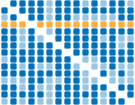Dryden, John: Mr. Oldham emlékezetére (To the Memory of Mr. Oldham in Hungarian)
|
To the Memory of Mr. Oldham (English)Farewell, too little, and too lately known, Whom I began to think and call my own: For sure our souls were near allied, and thine Cast in the same poetic mold with mine. One common note on either lyre did strike, And knaves and fools we both abhorred alike. To the same goal did both our studies drive; The last set out the soonest did arrive. Thus Nisus fell upon the slippery place, While his young friend performed and won the race. O early ripe! to thy abundant store What could advancing age have added more? It might (what nature never gives the young) Have taught the numbers of thy native tongue. But satire needs not those, and wit will shine Through the harsh cadence of a rugged line. A noble error, and but seldom made, When poets are by too much force betrayed. Thy generous fruits, though gathered ere their prime, Still showed a quickness; and maturing time But mellows what we write to the dull sweets of rhyme. Once more, hail and farewell; farewell, thou young, But ah too short, Marcellus of our tongue; Thy brows with ivy, and with laurels bound; But fate and gloomy night encompass thee around.
|
Mr. Oldham emlékezetére (Hungarian)Kit csak kissé és késve ismerek, enyémnek tudtalak, isten veled! Rokon volt, biztos, kettőnk lelke, hisz költői szellem lakott benned is. Mindegy, melyikünk zengette a lantot, egyként utáltunk gazembert, bolondot. Minden művünk egy cél felé vezet, s mi későn jött, elsőként érkezett. A síkos úton Nisus így esett el, és ifjú társa lett a győztes ezzel. Gazdag termésedhez, te kora-érett, mit adhattak volna további évek? Talán (ezt nem tudhatni ifju korban) a verstanra tanított volna jobban. De szatírádból szellem szava szól, bármily darabos, érdes is a sor. Ritka dolog e nemes tévedés, hogy költőt tévútra csaljon az ész. Bár termésed begyűjtve túl korán, gyorsan is nőtt; s jövő évek során csak érlel az idő a vers édes során. Még egyszer, üdv, ifjú, isten veled; nyelvünk Marcellusa, ah, vége lett! Bár homlokod övezi a babér: végleg bekerített sorsod s a rideg éj.
|





